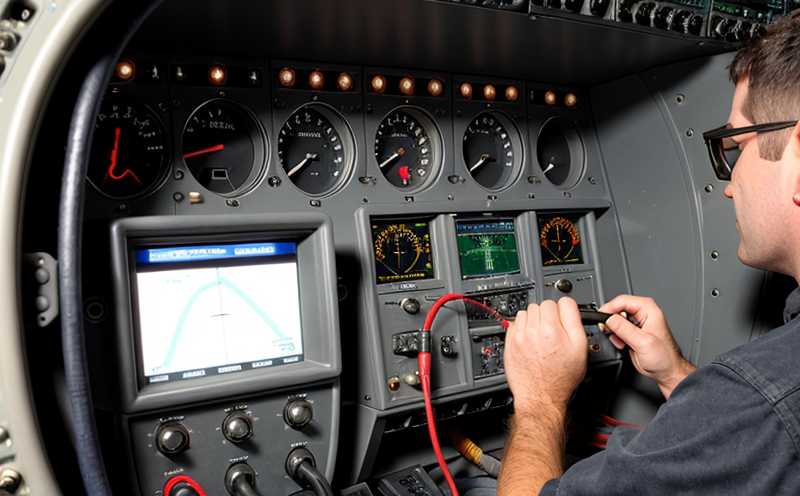RTCA DO-160 Section 7 Operational Shock Testing
The RTCA DO-160 series is a comprehensive set of standards developed by the Radio Technical Commission for Aeronautics (RTCA) to ensure the reliability and durability of aviation electronic equipment. Among these, Section 7 focuses on operational shock testing, which evaluates how avionics and electrical systems perform under severe mechanical shocks that might be encountered during flight or ground operations.
The objective is to simulate real-world conditions where components could experience sudden changes in acceleration, such as landing gear impact, engine start-up, or turbulence. This section plays a critical role in ensuring the integrity of avionics and electrical systems, thereby enhancing overall aircraft safety. The testing process involves subjecting specimens to controlled shock pulses that mimic the dynamic forces they may face during operational use.
Testing is performed using specialized shaker tables or drop towers that can replicate various shock environments. These devices generate impulses that closely resemble the impact forces experienced by avionics in different aircraft configurations and flight phases. The parameters for these tests are meticulously defined, ensuring consistency across all tests conducted under RTCA DO-160 Section 7.
Preparation of specimens involves securing them within fixtures designed to hold the components in place during the test. This ensures that any observed failures or performance issues can be attributed directly to the shocks and not to the way the equipment was mounted. The testing process itself typically includes a series of shock pulses applied along multiple axes, simulating different modes of impact.
The data collected from these tests is crucial for assessing the reliability and robustness of avionics systems. Engineers analyze the results to determine if there are any signs of damage or degradation in performance that could compromise safety. The standards specify acceptance criteria based on visual inspection, functional testing, and structural integrity checks.
By adhering to these rigorous tests, manufacturers ensure their products meet stringent industry requirements. This not only enhances the overall safety of aircraft but also builds consumer trust by demonstrating a commitment to quality and regulatory compliance. Compliance with RTCA DO-160 Section 7 is mandatory for avionics suppliers who wish to have their products certified for use in commercial or military aviation.
Understanding the implications of these tests on real-world scenarios is essential. For instance, during takeoff and landing, an aircraft's systems are subjected to significant shocks due to the rapid changes in altitude and speed. These conditions can stress avionics components beyond their normal operating ranges, necessitating thorough testing to ensure they remain functional under such extremes.
The results of these tests play a pivotal role in product development by guiding design improvements. Engineers use feedback from failed test runs to refine the structural integrity and durability of new models. This iterative process ensures that avionics systems evolve with each iteration, becoming increasingly resilient against operational shocks.
Why It Matters
The importance of RTCA DO-160 Section 7 cannot be overstated in the context of aerospace and aviation. This section is critical because it directly impacts the safety and reliability of avionics systems, which are integral to aircraft operations.
- Enhanced Safety: By ensuring that avionics can withstand severe shocks, these tests contribute significantly to overall flight safety. Failures in avionics due to operational shock can lead to catastrophic consequences, making this testing mandatory for compliance with aviation regulations.
- Regulatory Compliance: Meeting the requirements of RTCA DO-160 Section 7 is essential for manufacturers aiming to receive certification from regulatory bodies. This certification is necessary for avionics to be approved for use in commercial and military aircraft.
- Risk Reduction: The tests help identify potential weaknesses in design early on, allowing manufacturers to address these issues before products reach the market. This proactive approach minimizes the risk of field failures that could endanger passengers and crew.
- Brand Reputation: Consistent adherence to rigorous testing standards enhances a manufacturer’s reputation as a leader in quality and safety. Positive brand perception is crucial for maintaining customer trust and gaining competitive advantage.
Customer Impact and Satisfaction
The impact of RTCA DO-160 Section 7 testing on customers, particularly quality managers, compliance officers, R&D engineers, and procurement teams, is profound. These tests ensure that avionics systems meet the highest standards of reliability and durability, which directly translates to enhanced customer satisfaction.
- Quality Assurance: Quality managers can rely on comprehensive test reports from our laboratory to verify that all components comply with RTCA DO-160 Section 7. This ensures that only the highest quality products make it into the supply chain, reducing the risk of substandard items reaching end-users.
- Compliance Verification: Compliance officers find these tests invaluable for ensuring that avionics suppliers are adhering to all relevant standards and regulations. By providing conclusive test results, we assist in maintaining compliance across various jurisdictions.
- Innovation Support: R&D engineers benefit from the insights gained through our testing services. The data collected during these tests can be used to refine designs, improve materials, and enhance overall system performance. This support is crucial for advancing technology within the aerospace industry.
- Purchase Confidence: For procurement teams, knowing that suppliers have undergone rigorous testing provides peace of mind. This reduces the likelihood of purchasing faulty components and helps in building long-term relationships with reliable vendors.
Environmental and Sustainability Contributions
The environmental impact of RTCA DO-160 Section 7 testing is minimal. The tests primarily involve controlled mechanical shock simulation, which does not generate significant emissions or waste. However, the broader benefits of ensuring reliable avionics contribute positively to aviation sustainability.
Reliable avionics systems are a cornerstone of efficient flight operations, reducing fuel consumption and emissions per passenger mile. By minimizing the risk of in-flight failures that could lead to emergency landings or diversions, these systems also contribute to operational efficiency. This, in turn, helps airlines operate more sustainably by optimizing routes and reducing energy use.
Moreover, the durability ensured by this testing leads to longer-lasting avionics equipment, which can be recycled at end-of-life. This lifecycle approach supports environmental sustainability practices within the aerospace industry.





